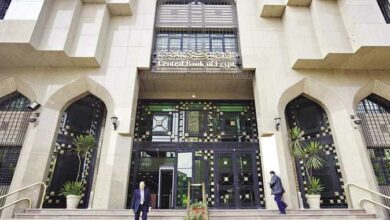Egypt’s budget deficit reached about LE146.5 billion in the first eight months of fiscal year 2012/13, equaling 8.2 percent of gross domestic product, according to the Finance Ministry’s monthly report.
Because of a confluence of economic malaises that are draining the state’s coffers, the deficit is expected to grow to LE185 billion by the end of the current fiscal year on 30 June.
In this changing dynamic, local banks have been actively financing the state deficit more, which means there’s less to offer private sector companies, whose share of total domestic credit decreased from 42 percent in June 2010 to 29 percent by the end of December 2012.
With a decline in revenues and increase in public spending, salaries and wages, plus the need to finance imports of basic commodities, compounded by a drop in foreign reserves as well as falling tourism and foreign direct investment, the state has come to depend on issuing treasury bills and bonds to financing the deficit. In turn, local banks have increasingly invested in these instruments, in an amount that has surged from LE266 billion at the end of 2010 to LE575 billion in 2012.
With these numbers in mind, bankers and experts debated last week whether the banking sector could viably continue financing the widening budget deficit by buying up treasury bills and bonds, with the downside being that this eats into their ability to finance private sector projects that may be more lucrative.
This debate was the main topic of a seminar held by the Egyptian Banking Institute of the Central Bank of Egypt, with a number of the country's top insiders highlighting the pros and cons.
Ola al-Khawaga, research and awareness director at the Egyptian Banking Institute, said the decline in the growth of the Egyptian economy since the 25 January uprising augmented the need for the banking sector to finance the budget deficit. This has been further exacerbated by successive credit ratings downgrades, making it more costly for Egypt to borrow from foreign lenders, and, in turn, positioning domestic borrowing from local banks as the main source of deficit financing.
In this context, attempts are being made to harmonize the role of Egyptian banks in supporting the state deficit, as well as the sector's vital developmental role in financing the private sector, all while taking into account the pressing need to maximize profitability.
Mona al-Baradei, chief executive of EBI, warned against the negative effects of crowding out funding for the private sector, thus impeding expansion of investment activities and negatively impacting productivity and exports.
Baradei said the increase in banks financing government has also affected employment indicators, besides increasing the government’s portion of domestic credit at the expense of the private sector's share of the banking sector’s financing pie.
Mounir al-Zahid, chairperson and chief executive officer of Banque Du Caire, said banks are not pressured into financing the deficit, and do so at their own discretion.
He pointed to a significant decline in credit demand by businesses and companies, most of which have put projects and expansion plans on hold as they wait and see whether conditions in the country will improve.
“There haven’t been any greenfield projects, whether big or medium, demanding loans lately. There is no appetite from foreign investors to start any projects in the country, awaiting political stability. From our point of view as bankers, there isn’t any fear of crowding out. Financing the budget deficit under the current circumstances remains a safe option,” Zahid said.
Loan-to-deposit ratios in Egypt’s banking sector reached about 48 percent in September, which means banks are flush with liquidity they can afford to dispose of.
Among the advantages of this activity is that T-bills and bonds are less risky, are exempted from taxes, return higher profits, and are generally seen as a safer hedging instrument.
Still there are downsides, such as the impact on a bank’s credit rating due to a concentration of risk as well as driving interest rates and the cost of credit up, leading to inflation and a greater burden on the government.
“Returns on T-bills reached 11 percent in the past three months, while lending [private sector] clients is definitely more profitable,” and could exceed 16 percent on average, said Mohamed al-Etreby, managing director and CEO of the Egyptian Gulf Bank.
More importantly, the quick-fix results in government inaction to find effective solutions to stem the growth of domestic debt.
“But the [International Monetary Fund] loan could be a temporary solution,” Zahid said. “It is not enough to save the economy or to plug the funding gap, but it will prevent the collapse in the Egyptian currency and help resume interventions by regional and global investors.”
Egypt has resumed negotiations on an IMF loan, and may ask for more than the US$4.8 billion that has been under discussion for months.
Mohamed Ozalp, managing director and CEO of Blom Bank Egypt, described the measures as temporary, and until the economic system is restructuring and the flow of revenue reinvigorated — but given the indicators, this may take a while.
He stressed the existing lack of demand for loans, which has led to a decline in the loan-to-deposit ratio.
“The government has to come up with a program to minimize the amount of subsidy in the public budget. Otherwise, banks won’t be able to play a bigger role than they are playing now.
Etreby said the solution to the current economic crisis is not in local banks, but in sustainable stability. Reforming investment laws to assuage investors’ fears and cutting the size of subsidies in the public budget are vital, while making sure not to affect the poorer classes by trying to place the burden on the richer.
“Banks have reached their limit in investing in financing the budget deficit,” Ozalp said, meaning it will be difficult for them to continue this practice.




